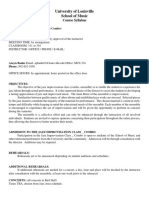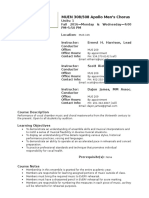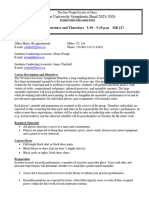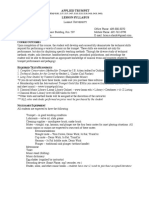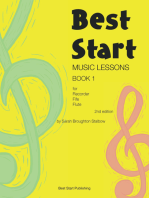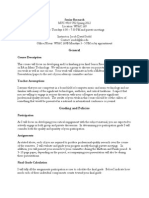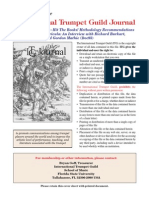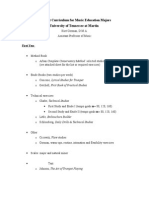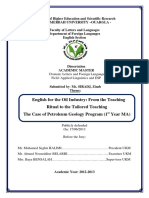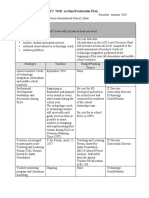0 ratings0% found this document useful (0 votes)
154 viewsFlute Syl Lab Us
Flute Syl Lab Us
Uploaded by
Neri RochaThis document outlines the course objectives, requirements, and policies for undergraduate studio flute lessons at the University of Mississippi. It details the grading breakdown and expectations for lessons, performances, exams, and juries. Students are expected to practice regularly, attend lessons prepared, and perform at least once per semester. The goals are to develop students' skills and ensure they master the expected material before advancing to the next level.
Copyright:
© All Rights Reserved
Available Formats
Download as PDF, TXT or read online from Scribd
Flute Syl Lab Us
Flute Syl Lab Us
Uploaded by
Neri Rocha0 ratings0% found this document useful (0 votes)
154 views12 pagesThis document outlines the course objectives, requirements, and policies for undergraduate studio flute lessons at the University of Mississippi. It details the grading breakdown and expectations for lessons, performances, exams, and juries. Students are expected to practice regularly, attend lessons prepared, and perform at least once per semester. The goals are to develop students' skills and ensure they master the expected material before advancing to the next level.
Copyright
© © All Rights Reserved
Available Formats
PDF, TXT or read online from Scribd
Share this document
Did you find this document useful?
Is this content inappropriate?
This document outlines the course objectives, requirements, and policies for undergraduate studio flute lessons at the University of Mississippi. It details the grading breakdown and expectations for lessons, performances, exams, and juries. Students are expected to practice regularly, attend lessons prepared, and perform at least once per semester. The goals are to develop students' skills and ensure they master the expected material before advancing to the next level.
Copyright:
© All Rights Reserved
Available Formats
Download as PDF, TXT or read online from Scribd
Download as pdf or txt
0 ratings0% found this document useful (0 votes)
154 views12 pagesFlute Syl Lab Us
Flute Syl Lab Us
Uploaded by
Neri RochaThis document outlines the course objectives, requirements, and policies for undergraduate studio flute lessons at the University of Mississippi. It details the grading breakdown and expectations for lessons, performances, exams, and juries. Students are expected to practice regularly, attend lessons prepared, and perform at least once per semester. The goals are to develop students' skills and ensure they master the expected material before advancing to the next level.
Copyright:
© All Rights Reserved
Available Formats
Download as PDF, TXT or read online from Scribd
Download as pdf or txt
You are on page 1of 12
UNDERGRADUATE STUDIO FLUTE SYLLABUS
Dr. Carol Dale, Associate Professor of Music
Scruggs Hall 131
Office: (662) 915-5589 Mobile: (662) 801-2978
Music Office: (662) 915-7268
COURSE OBJECTIVES
The following plan of study for studio flute is intended as a guide toward the development of minimal standards
in the music curriculum at the University of Mississippi. Since each level should indicate a growth that is built on
previously mastered levels, the prospective transfer student will be able to use this document to monitor their
progress toward being to the level expected upon entering Ole Miss.
Although a certain flexibility exists in the selection of appropriate solo literature between levels, there should be a
conscious effort to surpass the minimal standards concerning the other aspects listed. The expectations
represented are only the minimal amount of material that would be expected for a student to receive a letter grade
of C (a grade lower than C does not satisfy graduation requirements for the music major) and pass to the next
level. Graduate music majors must attain a grade of B or higher to proceed to the next level.
GRADING: (Scale: A=90-100; B=80-89; C=70-79; D=60-69)
Your semester grade is achieved by adding together the following:
60% of your grade (60 points) will be derived from individual lesson grades. Grades will be based on
attendance, punctuality, preparation, progress made between lessons, attitude, initiative, enthusiasm and
whether all necessary materials were brought to the lesson. A 1 credit hour lesson should result in
approximately 16 hours of instruction. Each one-hour lesson that is missed or in which there is
insufficient preparation will result in the reducing of the grade by 5 of the 60% daily lesson grade. As
with any other class, you are expected to obtain the necessary materials promptly. The normal
undergraduate workload for each semester is:
o 1 complete repertoire piece
o 6 etudes
o 4 exercises for the study of tone, articulation, and technique
Your weekly lesson grade will be based on the following elements:
PROMPTNESS: Be on time, warmed-up, & PREPARED for your lesson. When scheduling a lesson,
try to schedule so that you have time to warm-up and revitalize the music practiced the previous night.
PRACTICE: At least one hour per day of concentrated practice time is imperative for the music
education major. Three hours (daily) is necessary for the performance major. Since all assigned material
is designed to develop a complete musician, you should practice all assigned material every day. When
you enter the practice room, forget everything else. Practice purposefully, methodically, & meticulously.
Use a metronome, when applicable (scales, etudes, technical exercises), and listen to yourself as if
someone else (namely a teacher) were listening.
ATTENDANCE: Absences without a phone call (or some means of communication) are
unacceptable in most circumstances. If you must miss a lesson, please notify me as soon as
possible so that the lesson can be rescheduled. Absence from any lesson will be excused ONLY
for serious illness, family emergency, or other prescheduled Department of Music events only.
Every reasonable effort will be made to change or make up lessons, but lessons missed without
notification or cause will receive an F and will not be made up. Oversleeping is not a valid
excuse, and neither are fraternity/sorority duties.
20% of your grade will be based on your jury performance grade. All students will play a jury at the
end of the semester that will count 20% of the final grade. The jury performance is very important
because it offers the studio faculty members the opportunity to observe your progress as well as submit
constructive comments. A passing grade on the jury does not necessarily mean that you will be passed to
the next studio number. The student may be advised by the jury to repeat the current studio lesson
number if the level of performance has not increased adequately, or an inadequate amount of music was
mastered.
2
10% - Your midterm scale exam grade. All students (up to and including 321 level) perform a
midterm scale exam.
10% - Performance and attendance on Student Recital and/or Area Meetings.
o Your attendance is required at Student Recitals, Instrumental Area Meetings, woodwind guest
master classes, and recitals given by the woodwind faculty.
o All students (except FLUT 100) are required to perform at least once per semester. Students at
the 321 level and above are required to perform at least twice per semester, and are strongly
encouraged to do either a half or whole recital. 10% of your grade will be based on your
attendance at Area Meeting and woodwind ensemble performances. To receive 10 points
toward the final grade a student must attend 90% of the approved performances. Those
performances would include all formal recitals presented by the faculty woodwind quintet,
student woodwind quintets, and woodwind recitals. 8 points would be earned by attending 80%
of these performances, 7 points for 70%, etc. The failure to perform on Recital Hour or
Instrumental Area Meeting will result in the deduction of ten points from the final grade.
MATERIALS
Flute students are required to obtain a metronome and tuner during the first week of study. Students are required to
obtain all materials as quickly as possible. (Eble Music is the speediest and most reliable). Photocopied materials
are not acceptable or permitted in lessons as a permanent substitute for purchasing printed works.
ACCOMPANISTS
All students must work with an accompanist, unless performing music for solo flute. Contact Mr. Stacy Rodgers
(915-7027) or Ms. Adrienne Park (234-9573) to arrange for an accompanist. All students (with the exception of
students enrolled in FLUT 100, FLUT 121, and first-semester transfer students) will play on student recital and/or
area meeting and jury performances which usually involve accompanists. You are required to arrange for their
services at least three (3) weeks prior to the jury or performance date. Students who have not made arrangements
three (3) weeks prior to the performance will not be allowed to perform and will receive a failing grade for that
portion of the requirement. This will allow you to perform confidently and allow you to make music courteously
with an accompanist.
Regardless of the performance involved, any accompanist who is not adequately prepared will be immediately
excused from that lesson. *Any student who has not adequately rehearsed with their accompanist will be excused
from that lesson. All rehearsals and the level of preparation by the accompanist are the sole responsibility of the
individual flute student.* Please do not come to the lesson without having rehearsed at least twice with your
pianist. Use your lesson time wisely. Check with your accompanist to arrange workable times for rehearsals,
performances, and juries.
PERFORMING
With the exception of students enrolled in FLUT 100 students, each student registered for applied lessons will be
expected to perform at least once each semester on a (1:00 Wednesday) Wind-Percussion-String Area Recital or
on a (1:00 Wednesday) Student Recital.
All 341-level and above flute performance majors are required to prepare orchestral excerpts each semester. These
excerpts may be requested to be performed from memory. All performance majors are required to perform on at
least one complete concerto or solo work (for flute and orchestra or band) from memory on a solo recital before
graduation.
All students are strongly encouraged to play at least one half-recital per year. Performance majors must perform
one recital per year. While these requirements are not in the official departmental curriculum requirements, it is
assumed that as a professional flutist, you will be performing frequently and must be in command of a large body
of flute literature. In addition, all flute performance majors are expected to audition for all possible local and
regional competitions and auditions, especially the University of Mississippi Department of Music Concerto
Competition and the Flute Festival Mid-South competitions (as appropriate).
3
JURIES
Scale exam: There will be a graded midterm scale exam in which ALL students (321 level and below) will play
their scale and arpeggio requirements. See the "Scale and Arpeggio" requirements for FLUT 100-321 levels.
All students will play a final jury. Your jury performance is also very important, as this is the opportunity for
various faculty members to determine your progress and offer comments. It is important to note that is possible to
receive a passing grade from the jury as well as for the semester, but still be required (by the faculty jury) to
repeat the current applied lesson registration. IMPORTANT: If you fail the jury, it is likely that you will have to
repeat that level of lessons again. You can repeat the lesson level only once.
The jury performance is your final examination for applied lessons. It is scheduled during the week of final
exams. It consists of approximately ten minutes of music (a solo and etude or exercises) representative of your
work during the semester. We will typically select the jury repertoire near midterm, long before the jury date. Fill
out a jury sheet when they become available approximately 10 days prior to the jury. Bring it to me for approval
and signature.
PHYSICAL CONTACT
It is the policy of this flute studio that normal instruction in flute performance involves a certain amount of limited
and gender-neutral physical contact between the teacher and student when dealing with such subjects as breathing,
posture, finger/hand position, tension, musical performance techniques, etc. It is the responsibility of any student
who is in any way and at any time uncomfortable with this gender-neutral physical contact to immediately inform
the teacher of that discomfort and initiate a dialogue concerning physical contact.
You get out of your flute what you put into it. I want your lessons to be productive times where you can learn
how to be a great flute player and a well-rounded musician. That takes work, both inside and outside the studio.
If you are unclear or unhappy with the content or quality of your lessons, please let me know immediately. Each
of us is different and everyone responds in a different and unique way. Your success is very important to me.
Some people enter the world with greater gifts than others. Although we cannot create more talent than we have
been given, we can improve and refine the gifts we do have. This is known as practicing. You will achieve
greater success when you practice consistently and methodically, and I recommend the use of a practice journal.
ETHICAL STANDARD
I expect each one of you to take a leadership role in every class and ensemble, providing professional collegiality
and support for other students and teachers throughout the department, university, and community.
4
LITERATURE
Recommended literature for each level is to be taken from the solo list on the last page of this syllabus.
FLUT 100: PREPARATORY FLUTE (1 hour credit)
FLUT 100 is a preparatory course that can serve the needs of a student who plays flute as a secondary
instrument, a non-music major who wants to increase skills, or a music major or minor whose background is not
adequate to be successful in FLUT 121. This course does not count toward the degree requirements of a music
major or minor. The contents of this course include exercises for the development of music making skills
including tone, articulation, vibrato, music reading (rhythm), and musicality. Student must own and use a
metronome and a tuner.
Minimum standards for exiting FLUT 100 with a passing grade include:
1. Evidence of a characteristic tone and the ability to enhance the sound with vibrato (Flute Spa
exercises, Trevor Wye Practice Books for Flute, Omnibus Edition, pp. 7-23)
2. Successful performance of major scales by memory (4 sharps and 4 flats) over the range of the
instrument (from C1 to D4) in scale form (half=80)
3. The chromatic scale in eighth notes (from C1 to D4 with quarter=80)
4. The exercises of the Rubank Intermediate Method for Flute can be performed successfully
5. Solos appropriate to the level of the student
6. Successful performance of a jury at the end of the semester, and the recommendation of the
instrumental jury to move to FLUT 121
FLUT 121: FRESHMAN FLUTE I (1 hour credit)
Freshman Flute I is the first course in the sequence of studio instruction required for a music major or minor
whose principal instrument is the flute. With the approval of the instructor, FLUT 121 may be taken by the non-
major or non-flute principal whose level of ability meets the requirements for exiting FLUT 100. The contents of
this course include exercises for the development of music making skills including tone, articulation, vibrato,
technical facility, music reading (rhythm), and musicality. Student must own a metronome and a tuner. A
minimum of 90 minutes practice per day is expected.
Minimum standards for exiting FLUT 121 with a passing grade include:
1. Evidence of a characteristic tone and the ability to enhance the sound with vibrato (Flute Spa
exercises, Trevor Wye Practice Books for Flute, Omnibus Edition, pp. 7-23)
2. All major scales and major arpeggios by memory (half = 80)
3. Selected studies from the Trevor Wye Practice Books for Flute, Omnibus Edition. This should
include the technical scales and arpeggios, pp. 170-189
4. Trevor Wye Complete Daily Exercises, pp. 20-21
5. Hughes 40 Studies (International)
6. Cavally Melodious and Progressive Studies, Vol. 1 (Southern)
7. Solos selected from the Level I solo list, or solos of comparable or greater difficulty
8. Successful performance of scale jury at mid-term which will include major scales & arpeggios and
the chromatic scale
9. The recommendation of the instrumental jury (end of semester) to move to FLUT 122
FLUT 122: FRESHMAN FLUTE II (1 hour credit)
Freshman Flute II is the second course in the sequence of studio instruction required for a music major or
minor whose principal instrument is the flute. With the approval of the instructor, FLUT 122 may be taken by the
non-major or non-flute principal whose level of ability meets the requirements for exiting FLUT 121. The
contents of this course include exercises for the development of music making skills including tone, articulation,
vibrato, technical facility, music reading (rhythm), and musicality.
Minimum standards for exiting FLUT 122 with a passing grade include:
1. Evidence of a characteristic tone and the ability to enhance the sound with vibrato (Flute Spa
exercises)
2. All natural minor scales and minor arpeggios by memory (half = 80)
5
3. Trevor Wye Complete Daily Exercises (Novello) pentachord exercises on p. 20-21
4. Selected studies from the Trevor Wye Practice Books for Flute, Omnibus Edition. This should
include the technical scales and arpeggios, p. 170-189
5. Selected articulation studies from the Trevor Wye Practice Books for Flute, Omnibus Edition, p.
100
6. Hughes 40 Studies (International)
7. Cavally Melodious and Progressive Studies, Vol. 1
8. Ferling 48 Studies (Southern)
9. Solos selected from the Level I solo list, or solos of comparable or greater difficulty
10. Successful performance of midterm scale jury
11. The recommendation of the instrumental jury (end of semester) to move to FLUT 221
FLUT 221: SOPHOMORE FLUTE I (1 hour credit)
Sophomore Flute I is the third course in the sequence of studio instruction required for a music major or
minor whose principal instrument is the flute. With the approval of the instructor, FLUT 221 may be taken by the
non-major or non-flute principal whose level of ability meets the requirements for exiting FLUT 122. The
contents of this course include exercises for the development of music making skills including tone, articulation,
vibrato, intonation control, technical facility, music reading (rhythm), and musicality.
Minimal standards for exiting FLUT 221 with a passing grade include:
1. Evidence of a characteristic tone and the ability to enhance the sound with vibrato (Flute Spa
exercises and Trevor Wye, Practice Books for the Flute)
2. All harmonic minor scales (half = 80)
3. Trevor Wye Complete Daily Exercises (Novello) pentachord exercises on p. 22-23
4. Selected studies from the Trevor Wye Practice Books for Flute, Omnibus Edition, This should
include the technical scales and arpeggios, p. 170-189.
5. Andersen Etudes, Op. 15 or 33
6. Ferling - 48 Studies
7. Solos selected from the Level II solo list, or solos of comparable or greater difficulty;
8. Successful performance of scale jury at mid-term
9. The recommendation of the instrumental jury (end of semester) to move to FLUT 222
,
FLUT 222: SOPHOMORE FLUTE II (1 hour credit)
Sophomore Flute I is the fourth course in the sequence of studio instruction required for a music major or
minor whose principal instrument is the flute. With the approval of the instructor, FLUT 222 may be taken by the
non-major or non-flute principal whose level of ability meets the requirements for exiting FLUT 221. The
contents of this course include exercises for the development of music making skills including tone, articulation,
vibrato, intonation control, technical facility, music reading (rhythm), and musicality.
Minimal standards for exiting FLUT 222 with a passing grade include:
1. Trevor Wye Complete Daily Exercises (Novello) scale exercises on p. 20-27
2. All melodic minor scales (half = 80)
3. Selected studies from the Trevor Wye Practice Books for Flute, Omnibus Edition, This should
include the technical scales and arpeggios, p. 170-189.
4. Andersen Etudes, Op. 15 or 33
5. Ferling - 48 Studies
6. Solos selected from the Level II solo list, or solos of comparable or greater difficulty;
7. Successful performance of scale jury at mid-term which will include harmonic minor
8. The recommendation of the instrumental jury (end of semester) to move to FLUT 321
FLUT 321: JUNIOR FLUTE I (1 hour credit)
Junior Flute I is the fifth course in the sequence of studio instruction required for a music major or minor
whose principal instrument is the flute. With the approval of the instructor, FLUT 321 may be taken by the non-
major or non-flute principal whose level of ability meets the requirements for exiting FLUT 222. The contents of
this course include exercises for the development of music making skills including tone, articulation, vibrato,
intonation control, technical facility, music reading (rhythm), and musicality.
6
Instructor strongly recommends completion of a half or entire junior recital within the 321/322 level of
lessons.
Minimal standards for exiting FLUT 321 with a passing grade include:
1. Two performances on Student Recital and/or Area Meeting
2. Trevor Wye Complete Daily Exercises (Novello) scale exercises on p. 29-31, 52-65
3. All major thirds (Trevor Wye Complete Daily Exercises page 15-19 and p. 84-92) (quarter = 80)
4. Selected studies from the Trevor Wye Practice Books for Flute, Omnibus Edition. This should
include the technical scales and arpeggios, p. 170-189.
5. Andersen Etudes, Op. 15 or 33
6. Ferling - 48 Studies
7. Solos selected from the Level III solo list, or solos of comparable or greater difficulty;
8. Successful performance of scale jury at mid-term. Transfer students must be able to demonstrate
competency of all requirements for previous lesson levels (all major and minor scales and
arpeggios, and chromatic scale) and major thirds
9. The recommendation of the instrumental jury (end of semester) to move to FLUT 322
FLUT 322: JUNIOR FLUTE II (1 hour credit)
Junior Flute I is the sixth course in the sequence of studio instruction required for a music major or
minor whose principal instrument is the flute. With the approval of the instructor, FLUT 322 may be taken by the
non-major or non-flute principal whose level of ability meets the requirements for exiting FLUT 321. The
contents of this course include exercises for the development of music making skills including tone, articulation,
vibrato, intonation control, technical facility, music reading (rhythm), and musicality.
Instructor strongly recommends completion of a half or entire junior recital within the 321/322 level of
lessons.
Minimal standards for exiting FLUT 322 with a passing grade include:
1. Two performances on student recital and/or area meeting
2. Trevor Wye Complete Daily Exercises (Novello), p. 67
3. Selected studies from the Trevor Wye Practice Books for Flute, Omnibus Edition, This should
include the technical scales and arpeggios, p. 170-189.
4. Andersen Etudes, Op. 15
5. Bach-Cavally 24 Concert Studies
6. Karg-Elert 30 Studies, Op. 107
7. Solos selected from the Level III solo list, or solos of comparable or greater difficulty;
8. The recommendation of the instrumental jury (end of semester) to move to FLUT 421
FLUT 421: SENIOR FLUTE I (1 hour credit)
Senior Flute I is the seventh course in the sequence of studio instruction required for a music major or
minor whose principal instrument is the flute. With the approval of the instructor, FLUT 421 may be taken by the
non-major or non-flute principal whose level of ability meets the requirements for exiting FLUT 322. The
contents of this course include exercises for the development of music making skills including tone, articulation,
vibrato, intonation control, technical facility, music reading (rhythm), and musicality.
Instructor strongly recommends completion of a half or entire senior recital.
Minimal standards for exiting FLUT 421 with a passing grade include:
1. At least two performances on Student Recital and/or Area Meeting
2. Karg-Elert 30 Studies, Op. 107
3. Selected studies from the Trevor Wye Practice Books for Flute, Omnibus Edition, This should
include the technical scales and arpeggios, p. 170-189.
4. Andersen Etudes, Op. 33
5. Bach-Cavally 24 Concert Studies
6. Karg-Elert 30 Studies, Op. 107
7. Solos selected from the Level IV solo list, or solos of comparable or greater difficulty;
8. The recommendation of the instrumental jury (end of semester) to move to FLUT 422
7
FLUT 422: SENIOR FLUTE II (1 hour credit)
Senior Flute II is the eighth course in the sequence of studio instruction required for a music major or
minor whose principal instrument is the flute. With the approval of the instructor, FLUT 422 may be taken by the
non-major or non-flute principal whose level of ability meets the requirements for exiting FLUT 421. The
contents of this course include exercises for the development of music making skills including tone, articulation,
vibrato, intonation control, technical facility, music reading (rhythm), and musicality. Instructor strongly
recommends that student do either a half or an entire senior recital.
Minimal standards for exiting FLUT 422 with a passing grade include:
1. Karg-Elert 30 Studies, Op. 107
2. Boehm 24 Melodious Studies
3. Bitsch 12 Flute Studies
4. Andersen Etudes, Op. 60
5. Bach-Cavally 24 Concert Studies
6. Solos selected from the Level IV solo list, or solos of comparable or greater difficulty;
7. The recommendation of the instrumental jury (end of semester) to move to FLUT 521
FLUT 521: ADVANCED FLUTE I (1 hour credit)
Advanced Flute I is the ninth course in the sequence of studio instruction for the music performance major
whose principal instrument is the flute. FLUT 521 may be taken by the non-major or non-flute principal whose
level of ability meets the requirements for exiting FLUT 422. This course builds upon skills gained in the
previous flute studio lesson levels. The contents of this course include exercises for the development of music
making skills including tone, articulation, vibrato, technical facility, music reading (rhythm), and musicality.
Study materials may include Andersen Etudes, op. 60 and op. 63; Bozza 14 Etudes; Cavally Melodious and
Progressive Studies, books 2, 3, and 4; Jeanjean Etudes moderne; Mower Fingerbusters; and Paganini 24
Caprices; solo literature from the Level IV Solos List or material of comparable or greater difficulty. To move to
FLUT 522, the student must receive the recommendation of the instrumental jury at the end of semester.
FLUT 522: ADVANCED FLUTE II (1 hour credit)
Advanced Flute II is the tenth course in the sequence of studio instruction required for a music major or
minor whose principal instrument is the flute. With the approval of the instructor, FLUT 522 may be taken by the
non-major or non-flute principal whose level of ability meets the requirements for exiting FLUT 521. This course
builds upon skills gained in the previous flute studio lesson levels. The contents of this course include exercises
for the development of music making skills including tone, articulation, vibrato, technical facility, music reading
(rhythm), and musicality. Study materials may include Andersen Etudes, op. 60 and op. 63; Bozza 14 Etudes;
Cavally Melodious and Progressive Studies, books 2, 3, and 4; Jeanjean Etudes moderne; Mower Fingerbusters;
and Paganini 24 Caprices; solo literature from the Level IV Solos List or material of comparable or greater
difficulty. To move to FLUT 621, the student must receive the recommendation of the instrumental jury at the
end of semester.
FLUT 621: GRADUATE FLUTE I (1 hour credit)
Graduate Flute I is the eleventh course in the sequence of studio instruction for the music performance major
whose principal instrument is the flute. FLUT 621may be taken by the non-major or non-flute principal whose
level of ability meets the requirements for exiting FLUT 522. This course builds upon skills gained in the
previous flute studio lesson levels. The contents of this course include exercises for the development of music
making skills including tone, articulation, vibrato, technical facility, music reading (rhythm), and musicality.
Study materials may include Andersen Etudes, op. 60 and op. 63; Bozza 14 Etudes; Cavally Melodious and
Progressive Studies, books 2, 3, and 4; Robert Dick, Flying Lessons; Jeanjean Etudes moderne; Mower
Fingerbusters; and Paganini 24 Caprices; solo literature from the Level IV Solos List or material of comparable or
greater difficulty. To move to FLUT 622, the student must receive the recommendation of the instrumental jury
at the end of semester.
FLUT 622: GRADUATE FLUTE II (1 hour credit)
Graduate Flute II is the eighth course in the sequence of studio instruction required for a music major or
minor whose principal instrument is the flute. With the approval of the instructor, FLUT 622 may be taken by the
8
non-major or non-flute principal whose level of ability meets the requirements for exiting FLUT 621. This course
builds upon skills gained in the previous flute studio lesson levels. The contents of this course include exercises
for the development of music making skills including tone, articulation, vibrato, technical facility, music reading
(rhythm), and musicality. Study materials may include Andersen Etudes, op. 60 and op. 63; Bozza 14 Etudes;
Cavally Melodious and Progressive Studies, books 2, 3, and 4; Robert Dick, Flying Lessons; Jeanjean Etudes
moderne; Mower Fingerbusters; and Paganini 24 Caprices; solo literature from the Level IV Solos List or material
of comparable or greater difficulty. To successfully complete 622, the student must receive the recommendation
of the instrumental jury at the end of semester.
PERFORMANCE STUDIO FLUTE
FLUT 241: SOPHOMORE FLUTE PERFORMANCE I (2 hours credit)
Sophomore Applied Flute I is the third course in the sequence of lessons satisfying the studio instruction
requirements of students majoring in flute performance. Since the performance major does not begin the
performance applied sequence until the sophomore year, the student must receive permission from the FLUT 122
instrumental jury to enroll in FLUT 241. This jury can be accomplished at the FLUT 122 jury time by performing
a 20 minute (double time slot) jury.
Minimal standards for exiting FLUT 241 with a passing grade include:
1. All the requirements listed in FLUT 221 & 222
2. Solos from the Level III list or higher
3. 2 orchestral excerpts
4. Recommendation of the jury at the end to proceed to FLUT 242
FLUT 242: SOPHOMORE FLUTE PERFORMANCE II (2 hours credit)
Sophomore Flute II is the fourth course in the sequence of lessons satisfying the applied lesson requirement
of students majoring in flute performance. The contents of this course include exercises for the development of
advanced music making skills including tone, articulation, vibrato, technical facility, music reading (rhythm), and
musicality.
Minimal standards for exiting FLUT 242 with a passing grade include:
1. All the requirements listed in FLUT 321 & 322
2. Solos from the Level III list or higher
3. 2 orchestral excerpts
4. Recommendation of the jury at the end to proceed to FLUT 341
FLUT 341: JUNIOR FLUTE PERFORMANCE I: (2 hours credit)
Junior Applied Flute I is the fifth course in the sequence of lessons satisfying the studio instruction
requirements for students majoring in flute performance. The contents of this course include exercises for the
development of advanced music making skills including tone, articulation, vibrato, technical facility, music
reading (rhythm), and musicality.
Study materials may include Andersen Etudes, op. 60 and op. 63; Bozza 14 Etudes; Cavally Melodious and
Progressive Studies, books 2, 3, and 4; Gilbert Technical Flexibility for Flutists; Moyse Gammes et Arpeges and
20 Exercises and Studies; Jeanjean Etudes moderne; Mower Fingerbusters; and Paganini 24 Caprices; solo
literature from the Level IV Solos List or material of comparable or greater difficulty. To move to FLUT 342, the
student must receive the recommendation of the instrumental jury at the end of semester.
All 341-level and above flute performance majors are required to prepare four orchestral excerpts each
semester. These excerpts may be requested to be performed from memory. All 341-level and above students are
required to perform on at least one complete concerto or solo work (for flute and orchestra or band) from memory
on a solo recital before graduation.
FLUT 342: JUNIOR FLUTE PERFORMANCE II (2 hours credit)
Junior Applied Flute II is the fifth course in the sequence of lessons satisfying the studio instruction
requirements of students majoring in flute performance. The contents of this course include exercises for the
development of advanced music making skills including tone, articulation, vibrato, technical facility, music
reading (rhythm), and musicality.
9
IMPORTANT: The student is required to present one half length recital in partial fulfillment of course
requirements for the performance degree. To proceed with the recital, the student must present a recital jury and
program notes two weeks prior to the scheduled recital. The jury may grant permission to proceed with the
recital, or require the student to postpone the recital.
The contents of this course include exercises for the development of music making skills including tone,
articulation, vibrato, technical facility, music reading (rhythm), and musicality. Study materials may include
Andersen Etudes, op. 60 and op. 63; Bozza 14 Etudes; Cavally Melodious and Progressive Studies, books 2, 3,
and 4; Gilbert Technical Flexibility for Flutists; Moyse Gammes et Arpeges and 20 Exercises and Studies;
Jeanjean Etudes moderne; Mower Fingerbusters; and Paganini 24 Caprices; Solo Literature from the Level IV
Solos List or material of comparable or greater difficulty. To move to FLUT 441, the student must receive the
recommendation of the instrumental jury at the end of the semester.
FLUT 441: SENIOR FLUT PERFORMANCE I (2 hours credit)
Senior Applied Flute I is the fifth course in the sequence of lessons satisfying the studio instruction
requirements of students majoring in flute performance. The contents of this course include exercises for the
development of music making skills including tone, articulation, vibrato, technical facility, music reading
(rhythm), and musicality. Study materials may include Andersen Etudes, op. 60 and op. 63; Bozza 14 Etudes;
Cavally Melodious and Progressive Studies, books 2, 3, and 4; Gilbert Technical Flexibility for Flutists; Moyse
Gammes et Arpeges and 20 Exercises and Studies; Jeanjean Etudes moderne; Mower Fingerbusters; and Paganini
24 Caprices and Solo Literature from the Level IV Solos List or material of comparable or greater difficulty. To
move to SAXN 442, the student must receive the recommendation of the instrumental jury at the end of the
semester.
FLUT 442: SENIOR FLUTE PERFORMANCE II (2 hours credit)
Junior Applied Flute II is the eighth course in the sequence of lessons satisfying the studio instruction lesson
requirements of students majoring in flute performance. A full recital should be given as partial fulfillment of
course requirements for the performance degree. To proceed with the recital, the student must present a recital
jury with program notes two weeks prior to the scheduled recital. The jury may grant permission to proceed with
the recital, or require the student to postpone the recital. The contents of this course include exercises for the
development of music making skills including tone, articulation, vibrato, technical facility, music reading
(rhythm), and musicality. Study materials may include Andersen Etudes, op. 60 and op. 63; Bozza 14 Etudes;
Cavally Melodious and Progressive Studies, books 2, 3, and 4; Gilbert Technical Flexibility for Flutists; Moyse
Gammes et Arpeges and 20 Exercises and Studies; Jeanjean Etudes moderne; Mower Fingerbusters; and Paganini
24 Caprices and Solo Literature from the Level IV Solos List or material of comparable or greater difficulty. To
move to SAXN 541, the student must receive the recommendation of the instrumental jury at the end of the
semester .
FLUT 541: ADVANCED FLUTE PERFORMANCE I (2 hours credit)
Advanced Applied Flute I is a studio instruction course designed for the master's performance major whose
major instrument is flute. The contents of this course include exercises for the development of advanced music
making skills including tone, articulation, vibrato, technical facility, music reading (rhythm), and musicality. This
level may include a recital. To proceed with the recital, the student must present a recital jury and program notes
two weeks prior to the scheduled recital. The jury may grant permission to proceed with the recital, or require the
student to postpone the recital. Study materials may include Andersen Etudes, op. 60 and op. 63; Bozza 14
Etudes; Cavally Melodious and Progressive Studies, books 2, 3, and 4; Gilbert Technical Flexibility for Flutists;
Moyse Gammes et Arpeges and 20 Exercises and Studies; Jeanjean Etudes moderne; Mower Fingerbusters; and
Paganini 24 Caprices and Solo Literature from the Level IV Solos List or material of comparable or greater
difficulty. To move to FLUT 641, the student must receive the recommendation of the instrumental jury at the
end of semester 2.
FLUT 542: ADVANCED FLUTE PERFORMANCE II: (2 hours credit)
Advanced Applied Flute I is the second studio instruction course designed for the master's performance
major whose major instrument is flute. This level may include a recital. To proceed with the recital, the student
10
must present a recital jury two weeks prior to the scheduled recital. The contents of this course include exercises
for the development of music making skills including tone, articulation, vibrato, technical facility, music reading
(rhythm), and musicality. Study materials may include Andersen Etudes, op. 60 and op. 63; Bozza 14 Etudes;
Cavally Melodious and Progressive Studies, books 2, 3, and 4; Gilbert Technical Flexibility for Flutists; Moyse
Gammes et Arpeges and 20 Exercises and Studies; Jeanjean Etudes moderne; Mower Fingerbusters; and Paganini
24 Caprices and solo literature from the Level IV Solos List or material of comparable or greater difficulty. To
move to FLUT 642, the student must receive the recommendation of the instrumental jury at the end of semester.
FLUT 641: GRADUATE FLUTE PERFORMANCE I (2 hours credit)
Graduate Flute Performance I is the third graduate course in the sequence of studio instruction satisfying the
lesson requirements for the graduate student in flute performance. This level may include a recital. To proceed
with the recital, the student must present a recital jury and program notes two week prior to the scheduled recital.
The contents of this course include exercises for the development of music making skills including tone,
articulation, vibrato, technical facility, music reading (rhythm), and musicality. Study materials may include
Andersen Etudes, op. 60 and op. 63; Bozza 14 Etudes; Cavally Melodious and Progressive Studies, books 2, 3,
and 4; Gilbert Technical Flexibility for Flutists; Moyse Gammes et Arpeges and 20 Exercises and Studies;
Jeanjean Etudes moderne; Mower Fingerbusters; and Paganini 24 Caprices and solo literature from the Level IV
Solos List or material of comparable or greater difficulty. To move to FLUT 642, the student must receive the
recommendation of the instrumental jury at the end of semester.
FLUT 642: GRADUATE FLUTE PERFORMANCE II (2 hours credit)
Graduate Flute Performance II is the fourth graduate course in the sequence of studio instruction satisfying
the lesson requirements of the graduate student in flute performance. This level may include a recital. To
proceed with the recital, the student must present a recital jury and program notes two week prior to the scheduled
recital. The contents of this course include exercises for the development of music making skills including tone,
articulation, vibrato, technical facility, music reading (rhythm), and musicality. Study materials may include
Andersen Etudes, op. 60 and op. 63; Bozza 14 Etudes; Cavally Melodious and Progressive Studies, books 2, 3,
and 4; Gilbert Technical Flexibility for Flutists; Moyse Gammes et Arpeges and 20 Exercises and Studies;
Jeanjean Etudes moderne; Mower Fingerbusters; and Paganini 24 Caprices and solo literature from the Level IV
Solos List or material of comparable or greater difficulty. To successfully complete FLUT 642, the student must
receive the approval of the jury at the end of the semester.
FLUT 100 SOLO LIST (solos must be this level of difficulty or higher)
Bach, JS Siciliano from Sonata in Eb
Bizet Entracte from LArlesienne
Faure Sicilienne
Faure - Morceau de Concours
Gaubert Madrigal
Gossec Tambourin
Handel Sonatas in F major, G minor, A minor
Marcello Sonatas, esp. Sonata in F major
Rutter Suite Antique (selected movements)
Telemann Minuet from the Suite in A minor
LEVEL I SOLO LIST (solos must be this level of difficulty or higher)
Bach, CPE A minor Solo Sonata, Hamburger Sonata, Concertos
Bloch Suite Modale
Chopin Variations on a Theme by Rossini
Donjon Pan! Pastorale
Faure - Sicilienne
Gluck Minuet and Dance of the Blessed Spirits
Godard Allegretto
11
Honegger Danse de la Chevre
Ibert Aria; Concerto (mvt. II)
Mozart Concerto in G major
Poulenc - Sonata
Quantz Concerto in G major
Saint-Saens - Romance
Schumann Three Romances
LEVEL II SOLO LIST (solos must be this level of difficulty or higher)
Bach, JS Sonatas, A minor Partita, Suite in b minor
Boehm Nel Cor Piu variations, op. 4
Bozza Image
Burton Sonatina
Chaminade - Concertino
Couperin Concert Royale #4
Debussy Syrinx
Devienne Concertos, Sonatas
Enesco Cantabile et Presto
Faure - Fantasie
Ferroud Trois Pieces pour Flute
Ganne Andante et Scherzo
Gaubert Sonatas, Nocturne & Allegro Scherzando
Godard Suite en Trois Morceaux
Griffes Poem
Hanson Serenade
Heiden - Sonatina
Hindemith Acht Stucke, Sonata
Hue Fantasie
Hummel Sonata in D Major, op. 50
Ibert Piece
Kennan Night Soliloquy
Kuhlau Six Divertissements
Leclair Sonatas
Marais Les Folies dEspagne
Martin Ballade
Martinu - Sonata
Mozart Flute Concertos in D and G
Mozart Andante in C
Muczynski Sonata, op. 14
Piston Sonata
Poulenc Sonata
Saint-Saens Airs de Ballet dAscanio
Schubert Introduction and Variations, op. 160
Taffanel Andante Pastoral et Scherzettino
Telemann Fantasies, Sonatas, Suite in a minor
Vivaldi Flute Concertos, Piccolo Concertos in a and C (PV
LEVEL III SOLO LIST (solos must be this level of difficulty or higher)
Baxtresser Orchestral Excerpts for Flute
Barber - Canzone
Bartok-Arma Suite Paysanne Hongroise
12
Berkeley Sonatina, Sonata
Borne Carmen Fantasie
Bozza - Agrestide
Briccialdi Carnival of Venice Variations
Casella Sicilienne et Burlesque
Copland Duo
Demersseman 6
th
Grand Solo
Doppler Hungarian Pastoral Fantaisie
Dubois Sonate
Dutilleux Sonatine
Foote A Night Piece
Fukushima Mei
Ibert Concerto
Jolivet Chant de Linos
Karg-Elert Sonata Appassionata
Khachaturian - Concerto
Liebermann Sonata, Concerto (also for piccolo)
Nielsen Concerto
Roussel Joueurs de Flute
Varese Density 21.5
LEVEL IV SOLO LIST (solos must be this level of difficulty or higher)
Berio Sequenza
Boulez Sonatina
Feld Fantaisie Concertante, Sonate
Messiaen Le Merle Noir
Milhaud - Sonatine
Prokofiev Sonata
Reinecke Concerto, Sonata "Undine"
Rodrigo Concierto Pastoral
Sancan Sonatine
Schoenfield Klezmer Rondos
Schwantner Black Anemones
Also level IV chamber music:
Barber Summer Music
Copland As It Fell Upon a Day
Crumb Vox Balaenae
Damase Trio
Debussy Sonate
Hindemith Kleine Kammermusik
Honegger Concertino da Camera
Martin Sonata da Chiesa
Poulenc Sextet
Stravinsky Octet
Villa-Lobos Bachianas Brasilieras , Choros
You might also like
- GeralDocument11 pagesGeralNeri RochaNo ratings yet
- Trombone Studio HandbookDocument19 pagesTrombone Studio Handbookapi-405690949100% (1)
- A Horn Player's Study GuideDocument24 pagesA Horn Player's Study GuideNeri Rocha100% (2)
- Voice Performance Studies Syllabus PDFDocument5 pagesVoice Performance Studies Syllabus PDFtessaNo ratings yet
- Concert Band/Marching Band: Course SyllabusDocument6 pagesConcert Band/Marching Band: Course Syllabusapi-259405361100% (1)
- 1920 Piano Handbook PDFDocument16 pages1920 Piano Handbook PDFSalih AktaşNo ratings yet
- UWW Studio PolicyDocument3 pagesUWW Studio PolicySamantha PinchardNo ratings yet
- Voice Handbook: Cal Poly Pomona Department of MusicDocument32 pagesVoice Handbook: Cal Poly Pomona Department of MusicM. LorenzoNo ratings yet
- MUS1510 Applied VoiceDocument4 pagesMUS1510 Applied VoiceNicholas Benjamin-Gene FuquaNo ratings yet
- Syllabus - Wind Ensemble 2014Document3 pagesSyllabus - Wind Ensemble 2014api-175099225No ratings yet
- Applied Horn Syllabus - Spring 2009Document12 pagesApplied Horn Syllabus - Spring 2009Victor Mansella100% (1)
- Voice Syllabus NWSADocument2 pagesVoice Syllabus NWSAL.a.ZumárragaNo ratings yet
- Applied Trumpet Studio SyllabusDocument17 pagesApplied Trumpet Studio SyllabusNeri Rocha50% (2)
- University of Louisville School of Music: Course SyllabusDocument3 pagesUniversity of Louisville School of Music: Course SyllabusLucas ToméNo ratings yet
- Syllabus ChoirDocument7 pagesSyllabus Choirapi-269380880No ratings yet
- Muap 1169 - 1269 Fa 2023Document3 pagesMuap 1169 - 1269 Fa 2023Tim HuberNo ratings yet
- Dolce Suono Fall 2018Document6 pagesDolce Suono Fall 2018emilymadison_No ratings yet
- GMS Handbook (Natalie Haugeberg)Document8 pagesGMS Handbook (Natalie Haugeberg)Victor FloresNo ratings yet
- S M S H S U: Vocal Area Student HandbookDocument20 pagesS M S H S U: Vocal Area Student HandbookM. LorenzoNo ratings yet
- Sullivan Middle School Choral Program 2016-2017 HANDBOOKDocument4 pagesSullivan Middle School Choral Program 2016-2017 HANDBOOKM. LorenzoNo ratings yet
- Syllabus - Percussion Ensemble 2014Document3 pagesSyllabus - Percussion Ensemble 2014api-175099225No ratings yet
- MMT 202-203 Course DescriptionDocument2 pagesMMT 202-203 Course Descriptionjoefreak9000No ratings yet
- Jazz Ensemble SyllabusDocument10 pagesJazz Ensemble SyllabusJohn ReynoldsNo ratings yet
- MUSI1160 GP1 Fall2017Document2 pagesMUSI1160 GP1 Fall2017Mauricio FrancoNo ratings yet
- Norwood Sample Handbook 1Document13 pagesNorwood Sample Handbook 1api-665678123No ratings yet
- THVC331 03 Voice Lesson For Musical Theatre Fall 2015 InstructorDocument4 pagesTHVC331 03 Voice Lesson For Musical Theatre Fall 2015 InstructorBrandon WeberNo ratings yet
- 13-14 Vocal HandbookDocument39 pages13-14 Vocal HandbookAbi Sulit100% (1)
- The University of Texas at San AntonioAdrian D. Griffin CompletissimoDocument16 pagesThe University of Texas at San AntonioAdrian D. Griffin CompletissimoNeri RochaNo ratings yet
- Bella Vocesyllabus2016Document8 pagesBella Vocesyllabus2016api-333714789No ratings yet
- 2017-2018 Syllabus BandDocument2 pages2017-2018 Syllabus Bandapi-292942872No ratings yet
- Lamar Euphonium SyllabusDocument7 pagesLamar Euphonium SyllabusAmen CornerNo ratings yet
- Band SyllabusDocument3 pagesBand Syllabusapi-233498062No ratings yet
- High School Choir HandbookDocument8 pagesHigh School Choir Handbookapi-534241054No ratings yet
- Voice20Manual202017 2018 PDFDocument34 pagesVoice20Manual202017 2018 PDFFaezah AzieNo ratings yet
- MUT1121 Syllabus Fall 2018Document5 pagesMUT1121 Syllabus Fall 2018KarliNo ratings yet
- Uscthornton: Muen 308/508 Apollo Men'S ChorusDocument8 pagesUscthornton: Muen 308/508 Apollo Men'S ChorusIvan TsangNo ratings yet
- MUSI32351 The MusicDocument7 pagesMUSI32351 The Musicwenzymalabosa1No ratings yet
- Choir Handbook '16-17Document4 pagesChoir Handbook '16-17Daniel F. SoutherlandNo ratings yet
- MUC-333-S01: Advanced Keyboard MusicianshipDocument2 pagesMUC-333-S01: Advanced Keyboard MusicianshipAndy DyetNo ratings yet
- WUSB Syllabus 2023-2024-OWLDocument10 pagesWUSB Syllabus 2023-2024-OWLbillyNo ratings yet
- GradingpolicyDocument2 pagesGradingpolicyapi-204649818No ratings yet
- Handbook 2018-19 eDocument8 pagesHandbook 2018-19 eapi-291935787No ratings yet
- Assessment ProjectDocument8 pagesAssessment Projectapi-380245101No ratings yet
- C. Aipperspach SP13MUAP 1162 1262 VoiceDocument4 pagesC. Aipperspach SP13MUAP 1162 1262 VoiceJosephNo ratings yet
- Handbook FinalDocument14 pagesHandbook Finalapi-242280070No ratings yet
- Oakes Junior High and High School Choir Syllabus/Handbook: Mr. Colt LienDocument4 pagesOakes Junior High and High School Choir Syllabus/Handbook: Mr. Colt LienColt LienNo ratings yet
- Applied Trumpet Lesson Syllabus: Ourse UtcomesDocument7 pagesApplied Trumpet Lesson Syllabus: Ourse UtcomesAmen CornerNo ratings yet
- The Berklee Voice Department Handbook: I. WelcomeDocument20 pagesThe Berklee Voice Department Handbook: I. WelcomeAGoddessNuNo ratings yet
- Wind Ensemble Disclosure 2019-20Document4 pagesWind Ensemble Disclosure 2019-20Dean SmithNo ratings yet
- Voice Area Handbook 2020 - 2021: Southern Illinois University Carbondale College of Liberal Arts School of MusicDocument27 pagesVoice Area Handbook 2020 - 2021: Southern Illinois University Carbondale College of Liberal Arts School of MusicM. LorenzoNo ratings yet
- Policies For Staff AccompanistsDocument4 pagesPolicies For Staff AccompanistsRebecca SorleyNo ratings yet
- 11-12 XHS Grading Policies-BandDocument2 pages11-12 XHS Grading Policies-BandkathrynmnelsonNo ratings yet
- Applied Trumpet Studio Syllabus PDFDocument17 pagesApplied Trumpet Studio Syllabus PDFdchernosky1100% (1)
- HandbookDocument13 pagesHandbookapi-321829409100% (1)
- Centralia High School Band Handbook: Ms. Stephanie Aarons, Band DirectorDocument9 pagesCentralia High School Band Handbook: Ms. Stephanie Aarons, Band DirectorDon NewNo ratings yet
- Voice SyllabusDocument5 pagesVoice SyllabusSamanthaNo ratings yet
- Syllabus - THEA 270 - Basic Musicianship - Fall 2021: Text (Required)Document5 pagesSyllabus - THEA 270 - Basic Musicianship - Fall 2021: Text (Required)Alex CramptonNo ratings yet
- Ghs Band Handbook 17-18Document8 pagesGhs Band Handbook 17-18api-296952054No ratings yet
- MUS 141 Lansing 2013fDocument6 pagesMUS 141 Lansing 2013fmeng yong lauNo ratings yet
- 6thchorus Grading Policy and Classroom Procedures20122013Document7 pages6thchorus Grading Policy and Classroom Procedures20122013HeatherNo ratings yet
- How to Play Dizi, the Chinese Bamboo Flute: Examination Syllabus (Grade 1 to Grade 6): How to Play Dizi, the Chinese Bamboo Flute, #4From EverandHow to Play Dizi, the Chinese Bamboo Flute: Examination Syllabus (Grade 1 to Grade 6): How to Play Dizi, the Chinese Bamboo Flute, #4No ratings yet
- Building A Better Trumpet Section: Dr. P. Bradley UlrichDocument7 pagesBuilding A Better Trumpet Section: Dr. P. Bradley UlrichNeri Rocha67% (6)
- Boston Symphony OrchestraDocument1 pageBoston Symphony OrchestraNeri RochaNo ratings yet
- Strauss, Richard - Concerto 2 Gliere - Concerto, Opus 91 Kling - Concerto Brillante Weber - ConcertinoDocument4 pagesStrauss, Richard - Concerto 2 Gliere - Concerto, Opus 91 Kling - Concerto Brillante Weber - ConcertinoNeri RochaNo ratings yet
- Audition Frenchhorn ReqDocument2 pagesAudition Frenchhorn ReqNeri RochaNo ratings yet
- Etude ListDocument3 pagesEtude ListNeri RochaNo ratings yet
- ASU Horn Excerpt ChecklistDocument1 pageASU Horn Excerpt ChecklistNeri RochaNo ratings yet
- 3 French Horn and Utility HornDocument1 page3 French Horn and Utility HornNeri RochaNo ratings yet
- 2 French Horn and Utility HornDocument1 page2 French Horn and Utility HornNeri RochaNo ratings yet
- Senior Research MUS 4910Document3 pagesSenior Research MUS 4910Neri RochaNo ratings yet
- Embouchure HornDocument9 pagesEmbouchure HornNeri RochaNo ratings yet
- Brass Warm Up and Technical Studies: Group 1, Long TonesDocument1 pageBrass Warm Up and Technical Studies: Group 1, Long TonesNeri RochaNo ratings yet
- 9512 LibsDocument6 pages9512 LibsNeri Rocha100% (1)
- Tuba SyllabusDocument5 pagesTuba SyllabusNeri RochaNo ratings yet
- Music Composition SyllabusDocument7 pagesMusic Composition SyllabusNeri RochaNo ratings yet
- Tuba CourseDocument3 pagesTuba CourseNeri RochaNo ratings yet
- Trumpet Curriculum For Music Education Majors University of Tennessee at MartinDocument9 pagesTrumpet Curriculum For Music Education Majors University of Tennessee at MartinNeri RochaNo ratings yet
- University of Arizona SchoolDocument2 pagesUniversity of Arizona SchoolNeri RochaNo ratings yet
- Trumpet As Scale JazzDocument2 pagesTrumpet As Scale JazzNeri Rocha100% (1)
- Patricia Spencer's Practice-TechniquesDocument1 pagePatricia Spencer's Practice-TechniquesNeri RochaNo ratings yet
- Faculty of Education and LanguagesDocument21 pagesFaculty of Education and LanguagesSeghwa Seg HwaNo ratings yet
- Guidelines On Contextualized Learning Resource Development Processes & WorkflowDocument11 pagesGuidelines On Contextualized Learning Resource Development Processes & WorkflowClaire Dawaton100% (1)
- Creative Classroom DesignsDocument52 pagesCreative Classroom DesignsirilavNo ratings yet
- Why Students Fail To Speak English After Getting Sixteen Years Education (Abdul Salam)Document44 pagesWhy Students Fail To Speak English After Getting Sixteen Years Education (Abdul Salam)Muhammad Nawaz Khan Abbasi83% (6)
- Toothbreesh Lesson PlanDocument3 pagesToothbreesh Lesson PlansaxymitchNo ratings yet
- Education Portfolio Self Assessment MatrixDocument1 pageEducation Portfolio Self Assessment Matrixapi-372639660No ratings yet
- Application Project PlanCity of IlaganDocument6 pagesApplication Project PlanCity of IlaganRonnie Francisco Tejano100% (1)
- SHS Sample PortfolioDocument17 pagesSHS Sample PortfolioChristel VirtucioNo ratings yet
- Bush University: Centre For Research and LearningDocument21 pagesBush University: Centre For Research and LearningInstitute for Circumpolar Health ResearchNo ratings yet
- Career Week Action PlanDocument2 pagesCareer Week Action PlanIsabel GuapeNo ratings yet
- JROTC HandbookDocument87 pagesJROTC HandbookbobwierNo ratings yet
- 10-1 Lesson 3Document8 pages10-1 Lesson 3api-245390199No ratings yet
- Homeschooling Question 1Document3 pagesHomeschooling Question 1Maribel Bonite PeneyraNo ratings yet
- Siradj ZinebDocument92 pagesSiradj ZinebMikheil MikheilNo ratings yet
- Flipping FantasticDocument53 pagesFlipping FantasticMandose Sama50% (2)
- Foreign Language II - SyllabusDocument4 pagesForeign Language II - SyllabusELVA LUCIA VEGA DIAZNo ratings yet
- 1.4 Margo Tripsa Action Eval PlanDocument4 pages1.4 Margo Tripsa Action Eval PlanMargo TripsaNo ratings yet
- Curriculum EvaluationDocument3 pagesCurriculum EvaluationMR. MBENJENo ratings yet
- Intermediate Spanish II-SNH 1050, Spring 2011: I: A L. W O: 508 C S H E: S A W at - P: 828-278-9816Document5 pagesIntermediate Spanish II-SNH 1050, Spring 2011: I: A L. W O: 508 C S H E: S A W at - P: 828-278-9816Amanda L. WilsonNo ratings yet
- Here Is My 2 Lesson Plans That Following My Curriculum PlanningDocument6 pagesHere Is My 2 Lesson Plans That Following My Curriculum Planningapi-284322670No ratings yet
- Clarity Guide 1112Document16 pagesClarity Guide 1112Prince PeterNo ratings yet
- Simple Research in ReadingDocument25 pagesSimple Research in ReadingJosenia Constantino100% (6)
- Canada Education SystemDocument36 pagesCanada Education SystemjoannNo ratings yet
- Coaching and MentoringDocument59 pagesCoaching and MentoringPaula JanNo ratings yet
- ROD ELLIS PrinciplesDocument1 pageROD ELLIS PrinciplesJannette Hernandez100% (2)
- NSTP 1 1st PDFDocument12 pagesNSTP 1 1st PDFTrisha Cristi Ramos AlmoniaNo ratings yet
- SAS.3.32.01C Application For Admission - Postgraduate Programmes Revised 2015Document5 pagesSAS.3.32.01C Application For Admission - Postgraduate Programmes Revised 2015anon_6963652No ratings yet
- DepEd Camsur Unnumbered Memo October 5Document3 pagesDepEd Camsur Unnumbered Memo October 5Gab Rielle FloresNo ratings yet
- MathematicsDocument152 pagesMathematicsapi-206732780No ratings yet
- JLPT Guide - JLPT N5 Grammar - Wikibooks Open Books For An Open World PHPDocument15 pagesJLPT Guide - JLPT N5 Grammar - Wikibooks Open Books For An Open World PHPNax ScNo ratings yet













